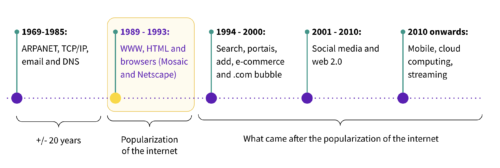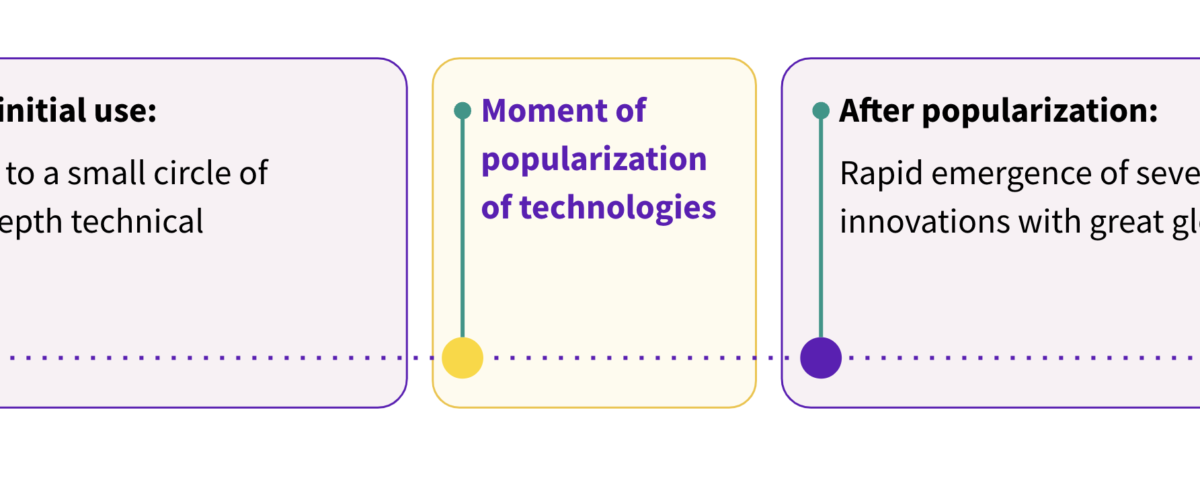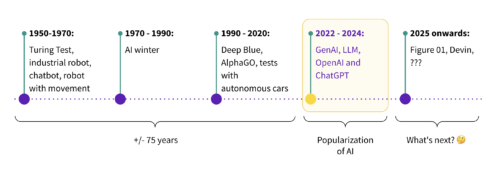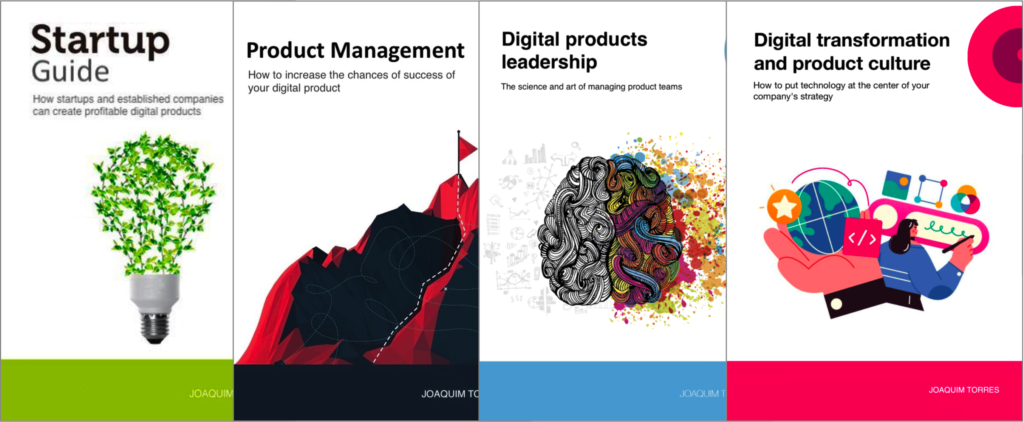
Agile, digital and product culture
20 de March, 2024
Deliver early and often
1 de April, 2024Two recent announcements caught my attention and gave me a sense of déjà vu. We are living in a turning point similar to the one we experienced at the beginning of the 1990s when we all started to get access to the Internet through browsers like Mosaic and Netscape and began to talk about HTML, WWW, hyperlinks, e-commerce, DNS, .com, and many other new and a bit strange terms.
There’s a pattern with the adoption of some technologies. After their creation, they have been used by a few people with in-depth technical knowledge for many years. Then, some use cases appear that popularize the technologies and make them useful to everybody. Then, several innovations with great global impact rapidly emerge.
That happened with the Internet, invented in the late 1960s but only became popular in the early 1990s thanks to WWW, HTML, and the browsers Mosaic and Netscape. Now, we can’t imagine our lives without it:
 Many technologies are still searching for use cases that will popularize them. Some examples of technologies that don’t yet have use cases that popularize them are NFT, Blockchain, Virtual Reality (VR), and Augmented Reality (AR).
Many technologies are still searching for use cases that will popularize them. Some examples of technologies that don’t yet have use cases that popularize them are NFT, Blockchain, Virtual Reality (VR), and Augmented Reality (AR).
One technology that I believe has found a use case that is popularizing it is AI, a technology from the 1950s that is becoming popular thanks to GenAI, LLM, and ChatGPT. These use cases are popularizing AI, analogous to what WWW, HTML, and browsers did for the Internet in the early 1990s:
What’s next? Here are two announcements made in the last 2 weeks that showed me that very exciting times are ahead of us!
Announcement #1: Devin, the first AI software engineer
The company Cognition announced Devin 2 weeks ago as an AI software engineer. I found the video very interesting, and it has the potential to make software development move big steps ahead.
I’ll share a story from almost twenty years ago that might help us understand what’s happening. I remembered this story as soon as I started hearing these concerns.
When I joined Locaweb in 2005 as its first product manager, we were about to launch a website builder. Locaweb was primarily a website hosting company at the time, so we had partnerships with web developers and website development companies. Many internal and external concerns existed that the launch of our website builder would harm our relationships with our partners and could drive many of them out of business.
What happened:
- More people started building websites because it was easier to create a website.
- Many website developers and web development companies have used the website builder to increase their production capacity.
- Many website developers and web development companies commented that after we launched the website builder, several new clients were generated for them. People who created their first website version with the website builder wanted something more customized.
So, I think the launch of software engineering AIs will take us giant steps forward, similar to what happened with website builders and web development 20 years ago.
In fact, it can be a great tool for product managers and designers, helping them develop their ideas and test them with customers.
Announcement #2: Figure and OpenAI partnership to launch a general-purpose humanoid robot
This video from the company Figure is also quite impressive. It shows the connection of robotics and generative AI large language models to help us in everyday tasks. This marks a significant milestone in integrating robotics and AI into our daily lives. Such technology’s implications are vast and far-reaching, promising to revolutionize how we approach everyday tasks and interact with our environment.
Imagine a future where these humanoid robots seamlessly assist us with household chores, provide companionship for the elderly, or even perform complex tasks in industries ranging from healthcare to manufacturing. The possibilities are endless, and the impact on society could be profound.
The déjà vu
Today, we can’t imagine our lives without the internet, without access to the internet anywhere we go through our mobile phones. Without social media, to be able to connect to whoever, even people we haven’t seen for years and even people we don’t know. Without the ability to shop online from anywhere. Without audio and video streaming.
However, in the early 1990s, we couldn’t imagine what was to come.
In my view, we are in a similar moment now, but instead of the internet, it’s AI, a mature technology that finally found a use case that popularized it (GenAI + ChatGPT). Many exciting innovations are starting to appear, such as Devin and Figure 01. I’m looking forward to what’s to come!
Workshops, coaching, and advisory services
I’ve been helping companies and their leaders (CPOs, heads of product, CTOs, CEOs, tech founders, and heads of digital transformation) bridge the gap between business and technology through workshops, coaching, and advisory services on product management and digital transformation.
Digital Product Management Books
Do you work with digital products? Do you want to know more about managing a digital product to increase its chances of success, solve its user’s problems, and achieve the company objectives? Check out my Digital Product Management books, where I share what I learned during my 30+ years of experience in creating and managing digital products:
- Digital transformation and product culture: How to put technology at the center of your company’s strategy
- Leading Product Development: The art and science of managing product teams
- Product Management: How to increase the chances of success of your digital product
- Startup Guide: How startups and established companies can create profitable digital products



